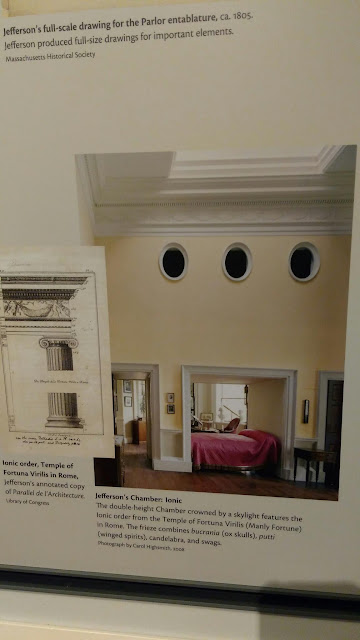My plan is to make a Colonial Jacket out of this fabric from Colonial Willisburg.
Two Teachers' Travels
Monday, April 24, 2017
James Madison's House: Montpelier
We arrived about 30 minutes before the house and visitor center closed so we did a quick walk around the grounds and up to the house. There was some event that people were preparing for that evening so we didn't go inside the house.
James Madison wrote the US Constitution and was the 4th president of the United States. We were very excited to see our book for sale at his house too!
A kind woman in the visitor center welcomed us and talked about how the property has changed over the years. The visitor center has only been there since 2008. The house was previously owned by a family named Dupont, who expanded the home, yet preserved the grounds and property. They were horse people and there is a complete racetrack on the way to Madison's home.
These properties were able to open and have many upgrades because of large financial contributions from individuals and families. Recently, these benefactors have had stipulations with their contributions. They want the whole story to be told about how these properties were able to thrive in the 1700s-1800s. It is because of slavery.
Saturday, April 22, 2017
Thomas Jefferson Museum at Monticello Visitors Center
There was a museum with some of Thomas Jefferson's real artifacts, but there were also some copies. The writing desk is a replica of the desk on which he wrote the Declaration of Independence. Also, the documents are all copies. The original Declaration is on display in the National Archives in D.C.
I want to see the original manuscript of the drafts of the Declaration of Independence. The issue of slavery was mentioned in the draft of the Declaration, but was taken out in the editing process to help the document gain favor with more delegates/people. I want to know more about this.
Train Ride Home
We had to get up and out the door early this morning to catch our return train back to VT/NH. We got an Uber ride (like a taxi) from the Hyatt Regency Crystal City hotel to Union Station. It was about $11, not too bad at all, considering it would have cost us $2.50 each to ride the metro plus a lot more hassle and time.
We grabbed breakfast, snacks, lunch, and coffee (of course) before getting on the train at 7:20am. Now we sit back, relax, read, check emails, etc. The woman next to me is a lawyer who works on transportation cases for the government in D.C. She is on her way to NYC for a wedding shower. The couple on our other side are from England and visiting universities. They are headed to Amherst, MA and then to Boston for a few days.
The train track is being maintained every Saturday for the next year, which means that we will have to get off the train in Springfield, Connecticut (home of James Naismith & Margaret E. Knight) and ride on a bus to New Haven, Connecticut where we will get back on the train for the rest of the journey. We should be back in Brattleboro by 5pm. My dad is coming to pick us up at the train stop.
Friday, April 21, 2017
Slavery at Monticello
We took another tour, Slavery at Monticello. Many people have pointed out the contradictory ideas that Thomas Jefferson wrote about freedom in his documents like the Declaration of Independence, yet he was the owner of many enslaved people. In the South, people relied on slave labor, yet many of the slave traders were wealthy northerners.
There were many slave families here on Monticello, but most of the people Jefferson inherited from his father or from his father-in-law. Over the course of his life, Jefferson owned about 600 enslaved people. At any one time, there were between 100-200 people working on his estate.
Slavery was different in the 1600s and 1700s than it was in the 1800s. Many white people and some black people were indentured servants in the early part of Colonial America. An indentured servant is a person who agrees to work for someone for free if that person pays their passage on a ship to come to the Americas. Usually a person would work for someone for about 7 years as part of this agreement, and then that person could go on their way to gain employment elsewhere or transition to being a paid worker. Who might want to sign up for this and why?
For more information about early slave laws in the colonies check out this site:
http://www.history.org/history/teaching/slavelaw.cfm
Another Tid Bit from our tour guide: The Industrial Revolution in the north could not have happened without the products from these plantations in the South.
We sat on benches on Mulberry Row, the street where the enslaved people lived, which was overlooking Thomas Jefferson's large terranced vegetable garden.





































